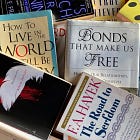On Voting, Lesson 1: A Nation of George Constanzas Will Not Remain Free
When we live outside-in, we believe circumstances and other people are responsible for how we feel and the success we achieve.
All week, in the run-up to the election, I will be dipping into my Foundation for Economic Education and Intellectual Takeout archives to create brief daily posts, not on the candidates, but on principles that may inform your decision. My advice is to choose candidates who you think best understands these principles.
As we go along, you will also see applications to our current work on The Road to Serfdom at Mindset Shifts U. For example, this post ties into Session 5.
George Costanza, a fictional character in Seinfeld, might be the most miserable, complaining “victim” in television history.
It has been over 33 years since NBC first broadcast an episode of Seinfeld titled “The Revenge.” George rashly tells off his boss and quits his job. Later that day, he sits in Jerry’s apartment, lamenting his future job prospects. Jerry gently probes George about his interests. “I like sports,” George replies, musing about being a general manager or an announcer. When Jerry points out that he has no qualifications for those jobs, George retorts, “Well, that’s really not fair.”
Starting at the top of any profession isn’t an option, but George doesn’t understand that. He schemes how to get ahead but lacks the initiative to do the actual work.
Organizations succeed by delivering value to their consumers. Individuals succeed by delivering value in their organizations to satisfy the needs of their managers and colleagues, as well as the consumers and suppliers with whom they interact.
George is a pro at shirking responsibility, making excuses, and blaming other people. He is an amateur at adding value in the workplace.
His misery comes from living life outside-in. When we live outside-in, we believe circumstances and other people are responsible for how we feel and the success we achieve. Living this way, we can’t help but try to control and manipulate those circumstances and people that we believe are responsible for our well-being.
It takes a lot of energy to live life outside-in; most often, our efforts to control life are futile. Our energy is depleted; we have nothing left to invest in creating value for others. Living this way is miserable.
Famed management guru Peter Drucker advises, “You will achieve the greatest results in business and career if you drop the word ‘achievement’ from your vocabulary and replace it with ‘contribution’.” Forbes calls this maxim Drucker’s Law and one of the “ten laws of the modern world.”
Drucker’s Law points us toward living life inside-out: looking more at what value we contribute and taking our focus off a sense of entitlement to what we think life owes us. Those who think like George violate Drucker’s Law. Misunderstanding the nature of life, they believe it’s about getting as much as you can without creating value for others.
Life demands of us “right action and right conduct,” writes psychiatrist Viktor Frankl. In one of the most profound books of the 20th century, Man’s Search for Meaning, Frankl draws on his experiences as a prisoner at Auschwitz and other concentration camps to reveal,
It did not really matter what we expected from life, but rather what life expected from us. We needed to … think of ourselves as those who were being questioned by life — daily and hourly.… Life ultimately means taking the responsibility … to fulfill the tasks which it constantly sets for each individual.
What we achieve isn’t the issue; the central issue is the value we create for others.
In his book Something For Nothing, personal and business development coach Brian Tracy could have been describing the George Costanza mentality: “The simplest explanation, requiring the fewest number of steps to explain any human behavior, is the desire of people to get what they want for as little as possible and, if at all possible, for nothing at all.”
Reality has caught up with Seinfeld. Today, arguing that the most qualified person should get the job, is considered by some a sign of racism.
Students may rail against unfairness and ask for loan forgiveness. Is it unfair that they are not being supported as they think they deserve? Is it unfair that the workplace does not demand more college graduates with degrees in film studies, art history, or feminist studies? It is hardly a sign of unfairness if they are unemployed or underemployed. Nobody directed their course of study, and nobody directs workforce demand. They made their own choices.
Look around: Are more and more of us thinking like George? Do we believe success is due us? Are we convinced the game is rigged against us? Are we demanding that the government do something about what we perceive as life's inherent unfairness? Politicians are eager to console us with their message that the market system has failed. They are eager to administer their remedies for our proclaimed misery.
With so many people thinking like George Costanza, Tracy offers a remedy: “The only way to create and maintain peace, harmony, and cooperation is to cut off all avenues to achievement except those of peaceful cooperation and healthy competition aimed at serving and satisfying other people in some way.”
The nation's economic health will revive and thrive as more Americans seek fulfillment and wealth by producing value for others.
To maintain liberty, study and reflection to guide our conduct are necessary. Please consider becoming a paid subscriber and gain access to the Mindset Shifts U community. We are committed to deepening our understanding of the principles that support inner and outer freedom.






Hear! Hear!
“Ask not what your country can do for you, but what you can do for your country!” -JFK
(Thx again Barry)
"It takes a lot of energy to live life outside-in... Living this way is miserable" Exactly! It's inefficient, ineffective and makes you feel terrible! So much easier to live the other way!